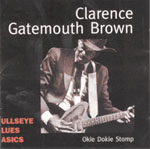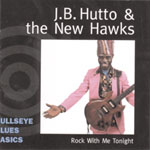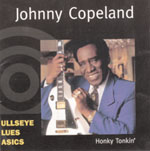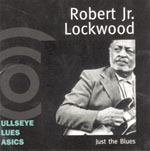|
Bullseye Blues Basics |
|
|
Clarence Gatemouth Brown |
 |
|
|
Johnny Copeland
|
|
J.B. Hutto & the New Hawks
|
 |
|
|
Robert Jr. Lockwood Just the Blues Bullseye Blues Basics BBB11661-9623-2 |
|
|
|
Reissue releases beg numerous questions: First, are the repackaged recordings already available on CD, and of equal production quality? If so, does the reissue bundle available material in a way that will make an artist’s work more accessible, particularly to new listeners? Also, regardless of availability, are the recordings and the performances they capture worth having in the first place? Or are they being reissued because it is quick, easy and inexpensive for record companies to repackage material from their vaults?
Rounder Records has launched its "Bullseye Blues Basics" reissue series with four of the finest, most authentic artists in the history of the blues — Clarence "Gatemouth" Brown, the late J.B. Hutto, the late Johnny Copeland and the very much alive Robert Jr. Lockwood — and reprises recordings each made for Rounder (in Hutto’s case, Rounder’s Varrick label) in the 1980s.
Of the initial four releases in the series, three feature material previously unavailable on CD. Lockwood’s Just the Blues is derived from the Rounder LPs Hangin’ On (1980) and Mister Blues Is Back to Stay (1981). Both were collaborations with the late Johnny Shines, whose deeply-rooted acoustic Delta blues focus struck an ideal balance with Lockwood’s jazzier tendencies, and while Shines appears on seven of the 12 cuts here, his presence is greatly diminished due to the performances not included — particularly when compared to the original Hangin’ On album. That’s a shame, because Hangin’ On — and Mister Blues, for that matter — is well worthy of reissue, intact, in the compact disk format.
The title of the Lockwood compilation is ironic, too, because he is less strictly a blues musician than any of the other artists featured here (Gatemouth Brown’s "don’t call me a bluesman" protestations notwithstanding). Lockwood — who was 65 and 66 at the time of these recordings — delivers his blues with a heaping dose of uniquely personal jazz sensibility, frequently featuring his 12-string guitar with the backing of a full, swinging horn section. For evidence, visit "Hangin’ On" or "Here It Is, Brother." Lockwood’s bluest moments here are with Shines in an acoustic duet setting, as on "Mean Mistreater."
That said, Just the Blues is a diverse, creative set of music that grooves and grooves and grooves. This material was long overdue for CD release and is a real pleasure to listen to.
J.B. Hutto’s Rock With Me Tonight repackages 1983 recordings originally released on the Varrick label as Slippin’ and Slidin’ (previously available only on cassette) and adds two unreleased cuts. Hutto, a South Carolina native but a Chicago resident for most of his life, was a noteworthy electric slide guitarist from the Elmore James school. He was a couple notches below fellow Windy City slidemaster Hound Dog Taylor on the reckless abandon scale, but Hutto was an effective and deeply moving entertainer nonetheless. (In fact, after Taylor’s death Hutto toured with Hound Dog’s band, the Houserockers, and recorded the highly-regarded Live 1977 album issued on the Wolf label in Europe.)
Rock With Me Tonight for the most part lives up to the promise of its title. Hutto rocks hard on the Elmore-styled cover of Fenton Robinson’s "Somebody Loan Me a Dime" and the R&B-flavored "Black’s Ball" and "Soul Lover," the latter two featuring the three-man Roomful of Blues reeds in tasteful support. Ron Levy also makes a guest appearance on piano. But the album suffers from occasional mundane, pedestrian moments, like the instrumental "New Hawk Walk."
Remarkably, given the vigor of these recordings, Hutto died from cancer only three months after they were completed. He was 57.
Johnny Copeland’s Honky Tonkin’ compiles cuts from several Rounder releases: Copeland Special (1981), Make My Home Where I Hang My Hat (1982), Texas Twister (1983), Bringin’ It All Back Home (1985) and Boom Boom (1989).
Copeland is associated with Texas and achieved his professional success after moving to New York in 1975, but his Louisiana roots are evident here too on "Make My Home Where I Hang My Hat." Copeland delves into a deeper set of roots with the thoroughly percussive "Kasavubu," the lone cut from the Bringin’ It All Back Home album which Copeland recorded in Africa with musicians from the Congo.
Copeland makes effective use of horns to drive his material, but it’s his dramatic vocal performances on Honky Tonkin’ that will capture the listener’s attention. The man could sing! And his vocal intensity was fully captured in these 1980s-era recordings before diminishing health could take its toll on his capacity as a vocalist. Copeland died in 1997 at age 60 from complications following his eighth heart surgery.
Gatemouth Brown’s Okie Dokie Stomp repackages cuts from the Rounder releases Alright Again! (1981), One More Mile (1983) and Real Life (1986), adding one live cut from a 1982 festival in Switzerland that was previously issued on the Justice Records release Blues for the Homeless. Given that all of the aforementioned Rounder titles are still available on CD, Okie Dokie Stomp derives its value as a tasty sampler of Brown’s Rounder material.
As much as Brown might resist the term "blues" in describing his musical persona, that’s mostly what you’ll hear on Okie Dokie Stomp — blues, flavored with swing and jazz. Gate’s horn arrangements are an integral part of his musical attack, not just garnish or window dressing, and they frame his understated, T-Bone Walker-flavored guitar work to make a cohesive ensemble statement on tracks like the instrumental title tune and the vocal cover of Albert Collins’ classic "Frosty."
Okie Dokie Stomp also includes a sampling of Gatemouth’s violin on the bayou barn-dance groove "Sunrise Cajun Style," and spotlights his harmonica on "The Drifter," a 10-minute workout originally issued on Blues for the Homeless.
The bottom line: There’s not a bad note on any of these four CDs. The Lockwood release merits particular attention because its selections had been unavailable in any format for years. If you’re starting from scratch with these artists or have to choose among these particular reissues, I’d rate them, purely for enjoyment purposes, as follows: (1) Brown, (2) Lockwood, (3) Copeland and (4) Hutto. Good stuff all around, and the Bullseye reissue producers promise "more to come."
— Bryan Powell
| ©2000 Blues Access, Boulder, Colorado, USA |

